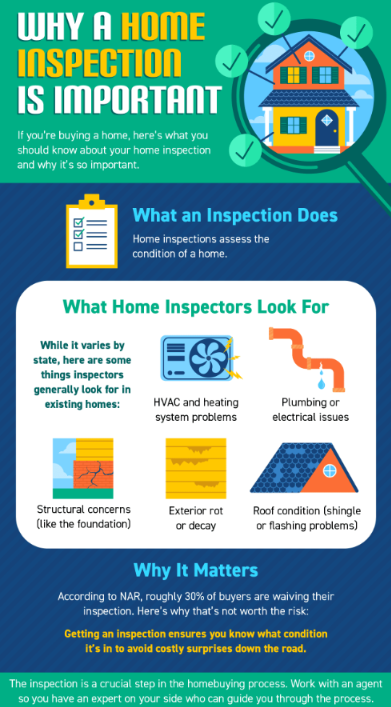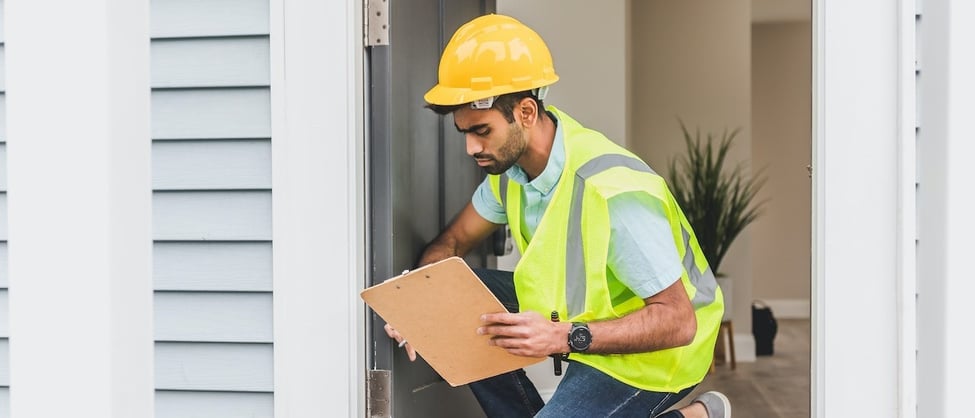If you're buying a home, here's what you should know about your home inspection and why it's so important.
What is a home inspection?
A home inspection is an objective visual examination of the physical structure and systems of a house, from the roof to the foundation. On average, a single-family home inspection usually takes 2-4 hours to complete, though this is heavily dependent on the size and condition of the home. After the inspection process, the inspector will send the client an inspection report (often within 24-48 hours) that covers their findings, complete with pictures, analysis, and recommendations.
What does a home inspection include?
The standard home inspector's report will cover the condition of the home's heating system, central air conditioning system (if applicable and temperature permitting), interior plumbing system, electrical system, the roof, attic and visible insulation, walls, ceilings, floors, windows and doors, foundation, basement, and structural components. It is important to note that there may be some exceptions. If certain areas are inaccessible (locked door, tenant's belongings in the way) or unsafe conditions (severely steep roofs, poor structural integrity), the inspector will explain the situation and note that they were not able to assess that specific area or system.
Why do homebuyers need a home inspection?
Buying a home could be the largest single investment the homebuyer will ever make. To minimize unpleasant surprises and unexpected difficulties, homebuyers should strive to learn as much as they can about the house before they buy it. A home inspection may identify the need for major repairs or builder oversights, as well as the need for maintenance to keep it in good shape. Through the home inspection process, homebuyers will have a better understanding of their prospective house, which will allow them to make decisions with confidence. If a homeowner is planning to sell their home, a home inspection can give them the opportunity to make repairs that will put the house in better selling condition.

Do the homebuyers have to be there?
It is not required for the homebuyers to be present for the inspection. However, it is always recommended as the homebuyer can receive the most value from the inspection as it allows them to observe the inspector and ask questions throughout the process. Many homebuyers find that talking with their inspectors gives them a better understanding of the condition of the home and how to maintain it.
Can a house fail a home inspection?
It is important to note that no house is perfect. Every home inspection will identify issues with the property and the inspector will communicate the severity of the issues found. The home inspector's goal is to provide their clients with a deeper understanding of their prospective home, so the client can make a sound decision as they continue their home-buying process. The client should be fully aware of any issues, risks, or health concerns that may impact the client's decision. The inspector's role is not to tell the clients if they should buy the house or not, but to help the clients understand the full cost of ownership. If major problems are found, homebuyers may wish to negotiate with the seller to make repairs or cover their costs.
What if an issue arises with a home inspection or report?
In some cases, the homebuyer may be displeased with the service the home inspector provided. Often in these situations, the homebuyer is left feeling that crucial defects or details were missed during the inspection process or left out of the inspection report. It is always best to first reach out to the home inspector and explain the concerns in the home inspection report. Sometimes, it may turn out to be a simple misunderstanding, with the inspector providing further explanation and clarifying the issue. In most provinces, home inspectors are licensed and follow the regulations put forth by their province and regulatory authority. If the homebuyer is not able to resolve their dissatisfaction with the home inspector directly, they are encouraged to contact their provincial governing body for information on how to proceed.
Why It Matters?
According to statistics, roughly 30% of buyers waive their inspection. Here's why that's not worth the risk: "Getting an inspection ensures you know what condition it's in to avoid costly surprises down the road."
The inspection is a crucial step in the home-buying process. Connect with me today so you have an expert on your side who can guide you through the process.
source: KCM, NAR, Society of Home Inspectors, realtor.com
Disclaimer: The above information is from sources believed reliable but should not be relied upon without verification. The publisher assumes no responsibility for its accuracy. You are encouraged to get independent legal advice before commencing any transaction.

